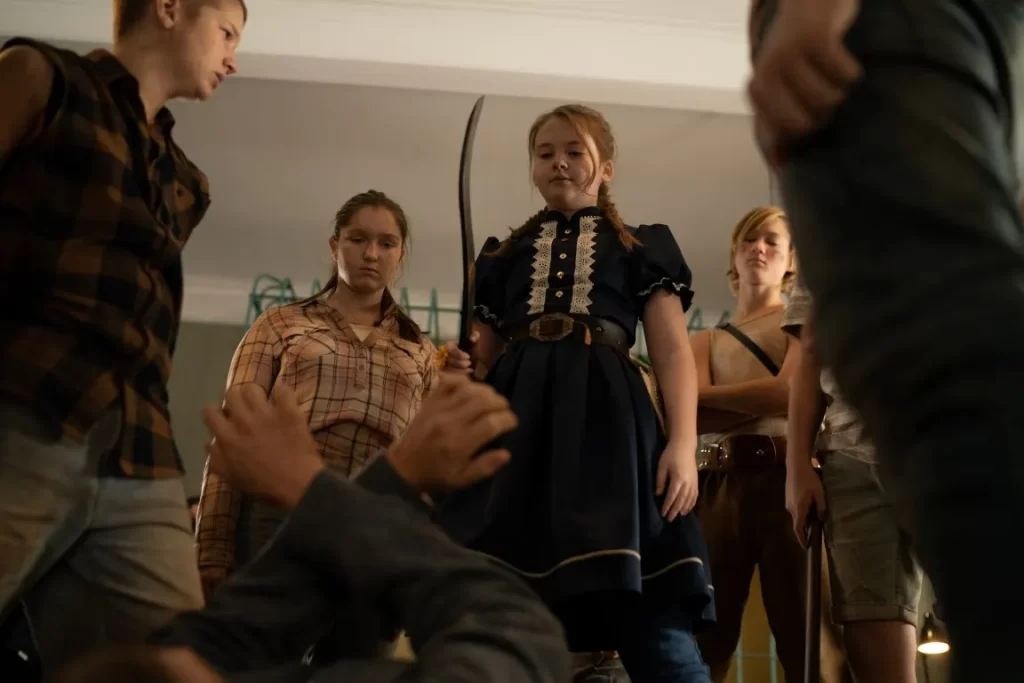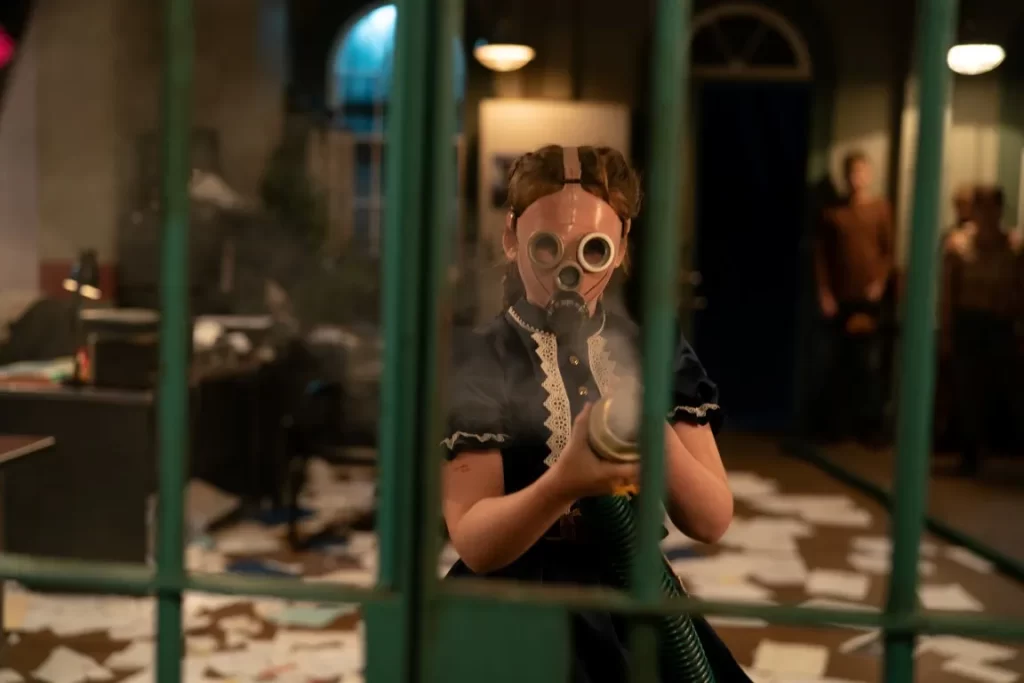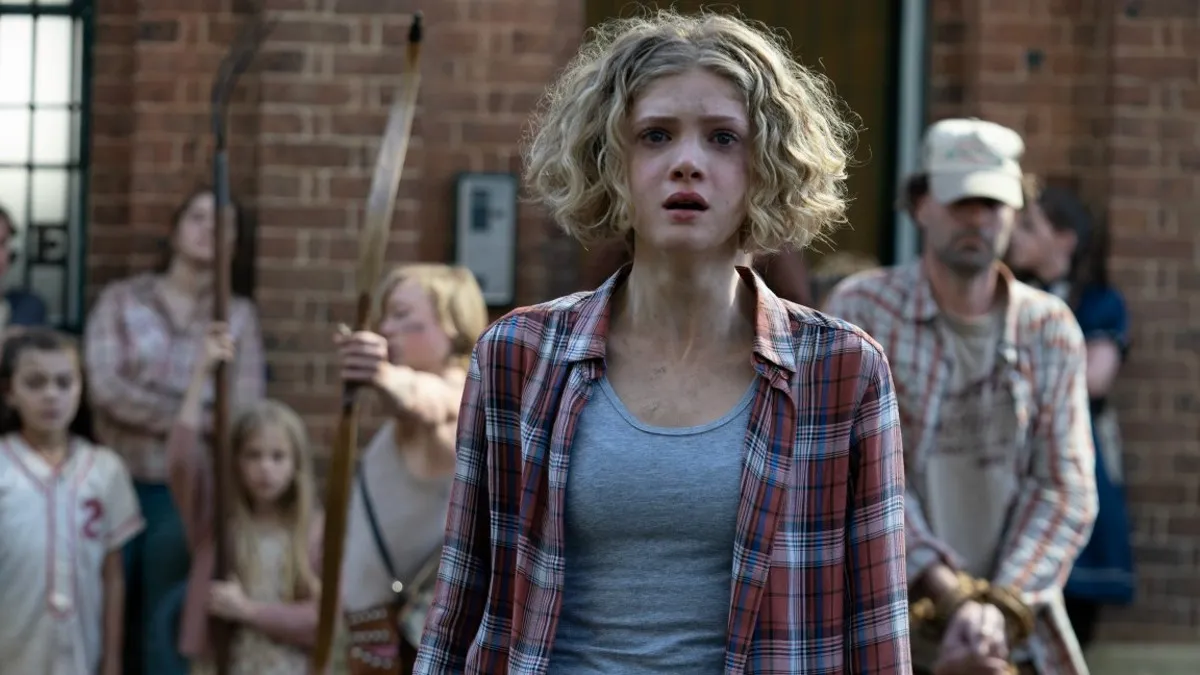THE PITCH: Kurt Wimmer’s 2023 addition to the enduring Children of the Corn saga, marking the astounding eleventh installment of a series that began as a direct, subtly tense rendition of Stephen King’s short story, soon spiraled into a direct-to-video maze. Surprisingly, Wimmer’s contribution was filmed pre-pandemic and showcased to a select audience in Sarasota, Florida, as a 2020 Halloween special. It was momentarily shelved, only to resurface for a fleeting theater release, then swiftly moved to Shudder.
Upon viewing Children of the Corn (2020/2023), one can understand the hesitance in presenting it to a wider audience. Even when placed against the backdrop of an already lackluster horror franchise, Wimmer’s interpretation emerges as a tedious, monotonous drag that bears only a faint resemblance to its namesake story.
The narrative is set in a deteriorating Nebraskan town overrun by sinister children, responding to cryptic directives from a concealed entity within the cornfields. That’s the gist. It poses as a sort of precursor to the original movie, portraying a horrifying incident at an orphanage. Amidst the tragedy, young Eden (portrayed by Kate Moyer of The Handmaid’s Tale) survives, traumatized and haunted by ambiguous whispers from the cornfields.
Furthermore, the crops are withering due to the adults’ neglect, leaving a bleak future for their progeny. Such dire circumstances might compel one to rally their peers and instigate a violent rebellion against the town’s adults. Enter Bo (played by Elena Kampouris), a spirited 17-year-old activist, as the potential savior.
FIELD OF SCREAMS: Except for the gripping opening scene reminiscent of the Texas Chainsaw era, Wimmer’s rendition scarcely evokes emotions other than ennui and sporadic, unintended chuckles. The screenplay is haphazard, sporadically reaching for social commentaries it fails to embrace. Unlike King’s cosmic horror, this version hones in on the detrimental effects of GMOs on crops, spotlighting the clashing groups torn between saving or destroying the crops for governmental relief.
The film’s initial segment exhaustively delves into this localized discord, repeatedly presenting actors grappling with some of the decade’s most cumbersome lines. Both Callan Mulvey and Bruce Spense, playing the roles of Bo’s father and the town’s clergyman respectively, are particularly underutilized in scenes set in town halls and amidst cornfields.

BO’S CHARACTERIZATION: Bo’s dialogue comes across as theatrically verbose, featuring lines one wouldn’t expect any genuine person to utter, such as “Toxins grow on the seeds of rotting crops!” Her pre-rampage strategies are so outlandish that it’s easy to miss she’s intended as the protagonist.
The ensemble cast isn’t spared either; subplots like Bo’s mother’s infidelity make brief appearances with little impact. Anticipated action sequences play out mostly off-screen. Characters introduced as pivotal (like Bo’s brother and a reporter she summons for coverage) meet abrupt fates. What remains are extended scenes of children meandering on dusty roads or standing in unison, merely filling gaps between the infrequent compelling moments.
The visual portrayal is underwhelming. Andrew Rowlands’ cinematography presents a desaturated, almost sickly yellow hue, marred further by the film’s inconsistent editing. Moments overstay their welcome or seem redundant. Attempted jump scares lose their timing, emerging too tardily to strike a chord.
The most disheartening are the subpar visual effects. By the time viewers discern shadows behind the cornfields, the graphics dip to Birdemic-like crudeness. Such craftsmanship, even a decade prior, wouldn’t meet the standards of even the most budget-conscious direct-to-video production.

A SILVER LINING: One redeeming quality of this rendition of Children of the Corn is Moyer’s eerily captivating performance. Her portrayal of Eden — a mix of sass, revenge, pastoral dresses, and maturity beyond her years — evokes memories of Human M3gan. It’s an intriguing choice for a horror flick, though it’s not clear how she wins the allegiance of her young peers.
Amidst a cast seemingly directionless, Moyer shines. She delivers her lines with the flair of a drag queen poised for an entertaining session at the library. Her role’s logic is elusive, but her enthusiasm offers a fleeting respite in a film largely devoid of genuine horror. Though she’s misplaced in this narrative, she’d seamlessly fit into a M3GAN sequel after the titular robot affords a more humanoid form. She’s proven her mettle.
THE VERDICT: Maintaining momentum is a tall order for any horror series eleven movies in. The Children of the Corn franchise, with perhaps one semi-passable edition, stands testament. But this installment’s blatant disregard for depth — its haphazard nods to contemporary issues and its fragmented approach — accentuates its shortcomings. Wimmer’s cinematic journey is inconsistent and sparse, his last venture being 2006’s criticized Ultraviolet. If this film hints at his current trajectory, a prolonged hiatus wouldn’t be missed.
SCREENING DETAILS: Children of the Corn makes its theater debut on March 3rd and finds its way to Shudder from March 21st.
